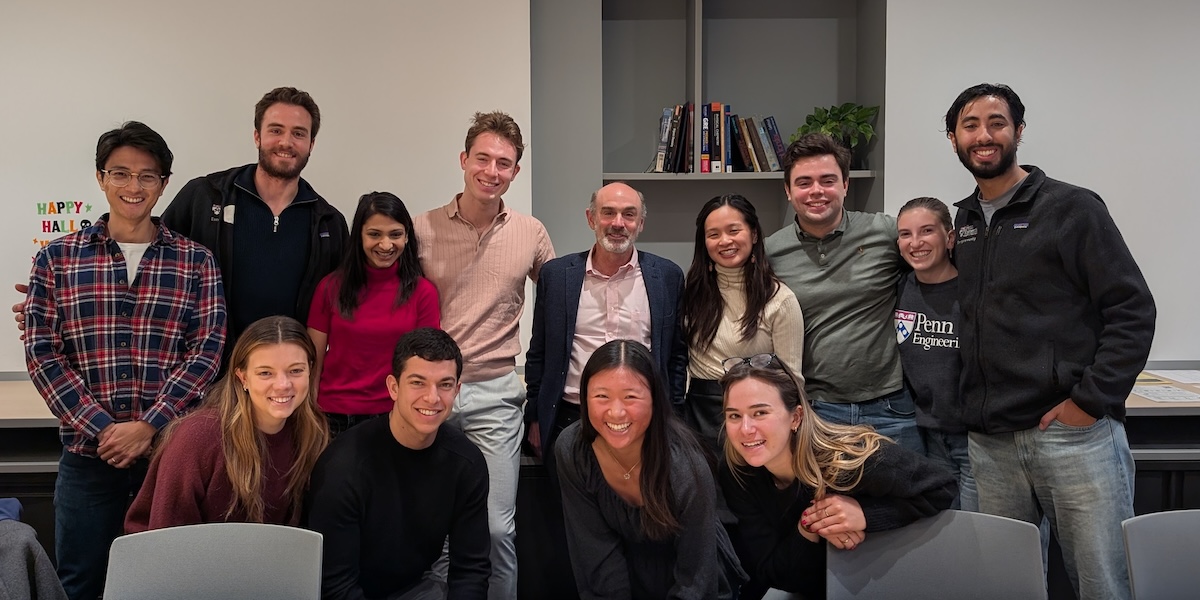
The room hums with anticipation. A group of would-be founders shifts in their seats, scribbling last-minute notes and readying their pitch decks. The lights dim as the projector flashes “AgriVue” onto the whiteboard and the first team steps up to the front, ready to deliver the pitch they’ve spent weeks rehearsing. Their goal is simple but monumental: convince the “investors” before them that their startup has the potential to change the world.
Facing the audience, master’s students Vani Kanoria (DATS’25) and David Bakalov (BE’25), Agrivue’s CEO and CMO, respectively, speak with practiced confidence. Their biodegradable soil sensors, they explain, are ready to take on agribusiness stalwarts like John Deere. With this technology, farmers can get real-time data on soil moisture and temperature, improving yields and resource efficiency. Because the sensors eventually dissolve, farmers will need to replace them regularly, guaranteeing recurring revenue. Kanoria and Bakalov’s eyes scan the crowd. The stakes feel as real as in any Silicon Valley boardroom.
But this isn’t a pitch session on Sand Hill Road, and these aren’t seasoned entrepreneurs. It’s the ninth week of class for the inaugural cohort of the Sugi and Millie Widjaja Engineering Entrepreneurship Fellows Program, a select cohort of students at the University of Pennsylvania School of Engineering and Applied Science (Penn Engineering) learning what it takes to transform ideas into potential companies. Their startups may be fictional, at least for now, but the lessons are entirely real.
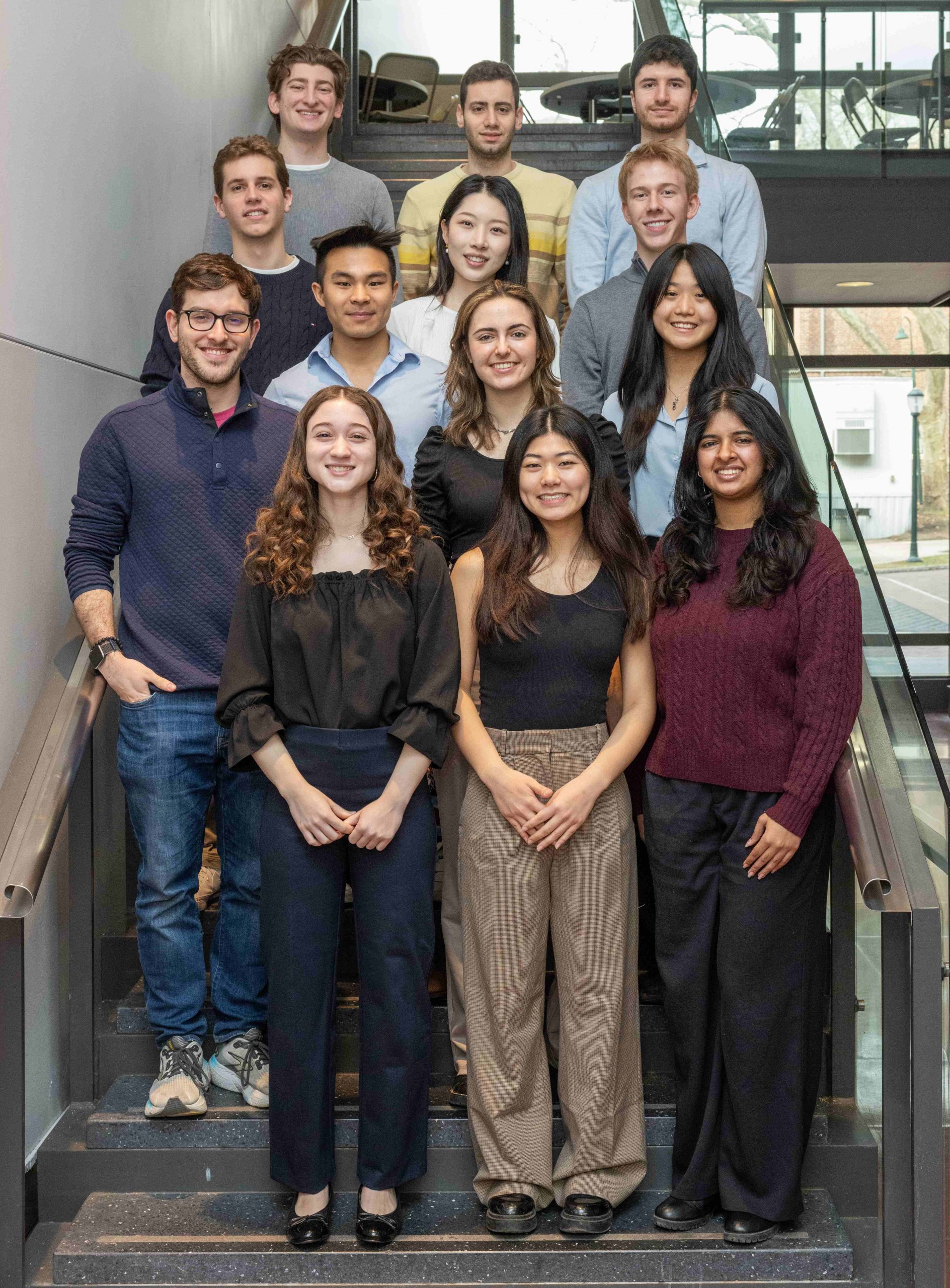
Tom Cassel (ME’68, GME’73, Gr’79), Practice Professor in Mechanical Engineering and Applied Mechanics and the instructor of the course, raises his hand. “You’re probably going to need to get seed funding before the Series A,” he says. Cassel knows what he’s talking about: in the late 1970s, he founded a consulting firm that grew into a significant independent power company that, by the 1990s, owned power-generating facilities with a combined capital value exceeding half a billion dollars.
When Kanoria and Bakalov return to their seats, master’s student Caroline Angerer (MSE’25) and combined-degree student Lindsay Park (SSE’25, IPD’26), the CMO and CFO of Sentrinox, take their place. Their company’s goal is to develop sensors for underwater robots to assess deepwater infrastructure like oil platforms and internet cables. “I think your 30 months is right on,” says Cassel, assessing the time they project needing to bring the product to market.
After an hour of presentations — including one from undergraduate Ondrej Gonzor (CIS’25) and the team behind PainSync, a wearable device designed to alleviate Achilles tendinitis — Cassel stands at the board to summarize the day’s takeaways. He emphasizes the need to simplify scientific jargon, a crucial skill for engineers moving from the lab to the market. “You’re asking for millions of dollars,” he says. “Don’t make it too technical — keep it friendly and professional.”
The Startup Surge
In 2023, the U.S. Department of Commerce registered a record-breaking 5.5 million business applications. The global number of “unicorns” — startups privately valued in excess of one billion dollars — has increased by more than 30-fold since the term was coined. In short, there may never have been a more popular time to be an entrepreneur.
Of course, many startup ventures never succeed, either by going public or being acquired. In 2017, Hendrik Bessembinder, of Arizona State University’s W.P. Carey School of Business, found that just 4% of stocks available for purchase between 1926 and 2016 accounted for 90% of the stock market’s wealth creation during that time.
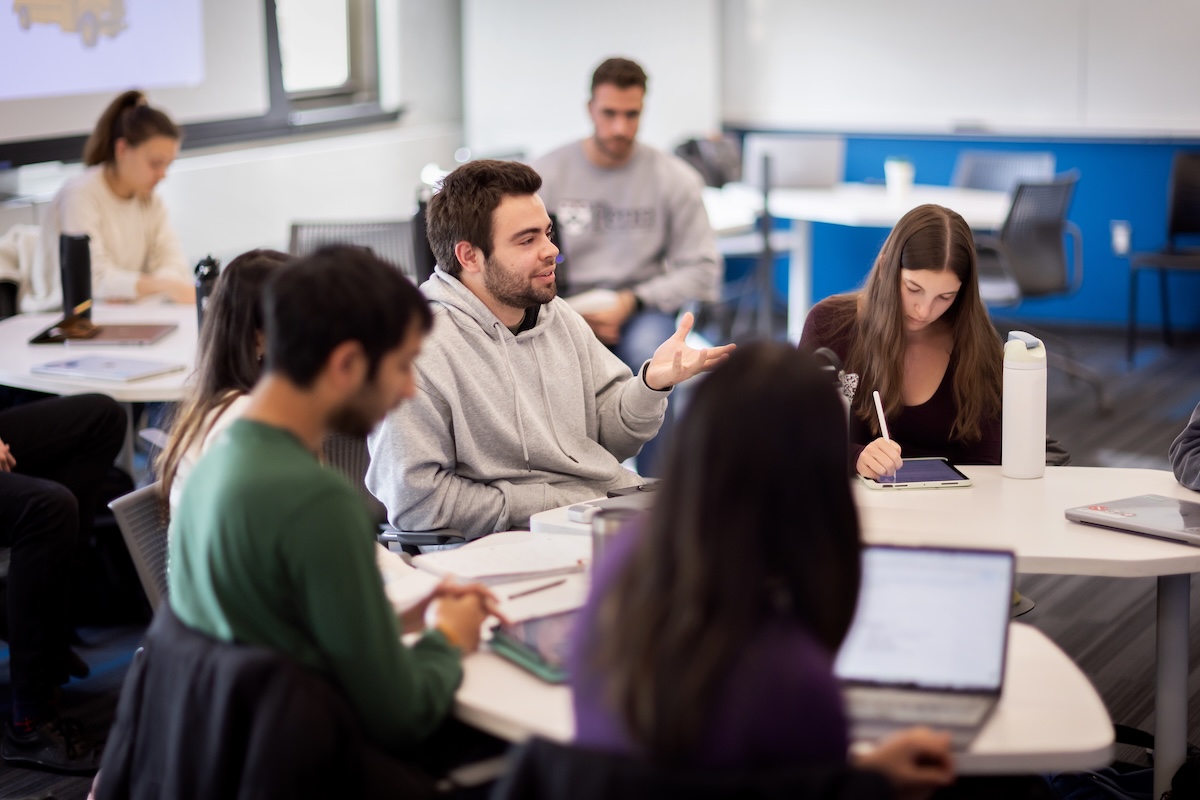
Still, despite the long odds, there are clearly lessons worth learning, and in particular for engineers. “Engineers tend to create the most influential, most impactful businesses,” says Bakalov, who hopes to develop new treatments for neurological disorders. “Think Microsoft, think Apple, think all these large companies that have changed the world.”
Founding the Fellows Program
After selling his own venture, Cassel considered retiring. Instead, he created Engineering Entrepreneurship (EENT), a suite of programs designed to teach Penn Engineers how to bring their ideas to market, which just celebrated its 25th anniversary.
For years, Cassel and Ted Schlein (C’86), a Penn Trustee and Silicon Valley veteran, envisioned an even more immersive experience within EENT — a program that would pair personalized mentorship with hands-on internships at startups. But launching such an ambitious initiative required more than just a vision; it demanded additional resources and dedicated staff, in particular someone capable of leveraging Penn Engineering’s alumni network while mentoring students directly.
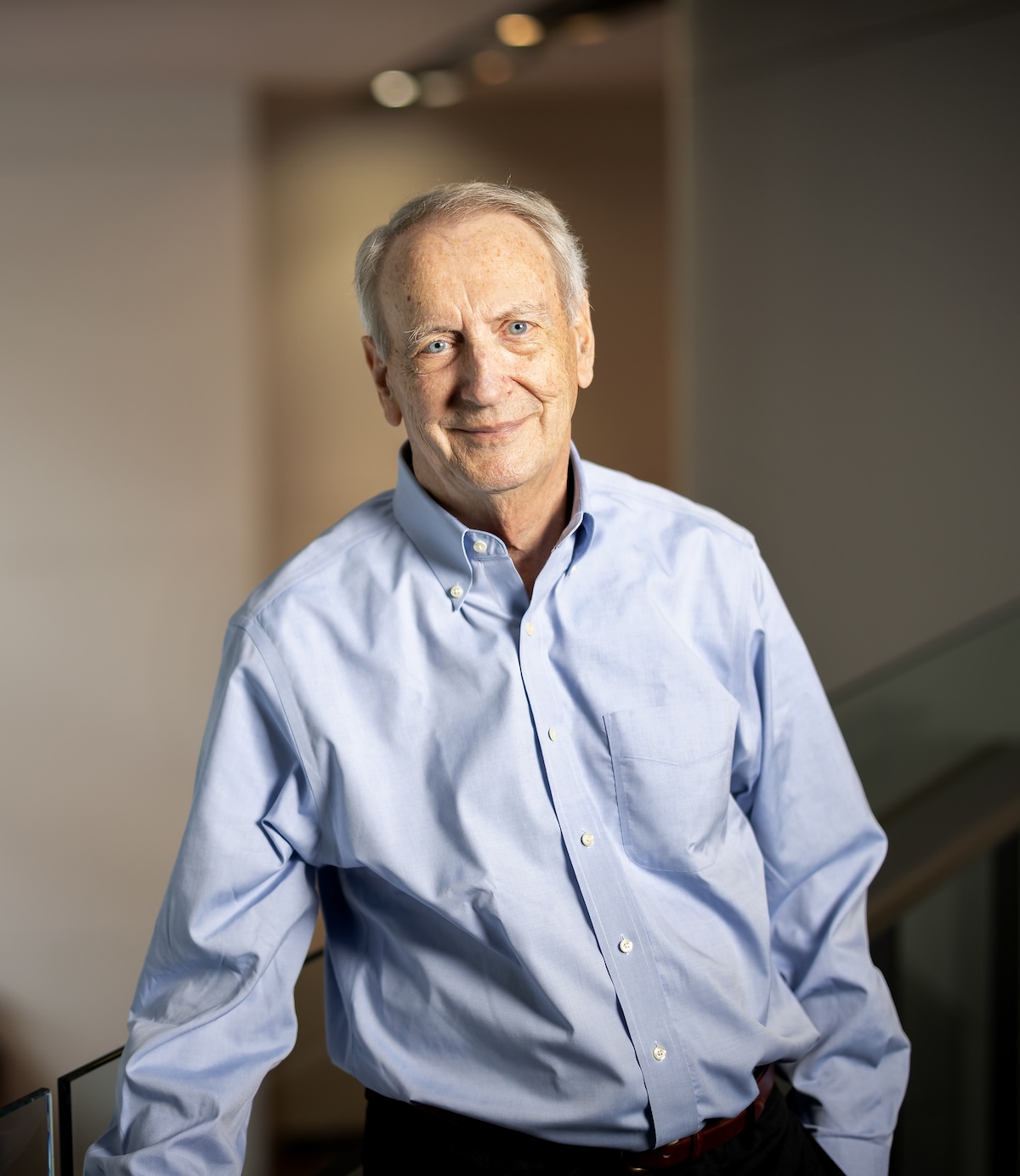
Enter Sevile Mannickarottu (EE’99, GR’15), the former director of the George H. Stephenson Foundation Bioengineering Educational Lab and Bio-MakerSpace. Now Penn Engineering’s Director of Technological Innovation and Entrepreneurship, Mannickarottu had years of experience guiding students through the rigors of Senior Design.
With strategic input from Schlein and the generous support of Sugi Widjaja (EE’00) and Millie Wan (W’01) — for whom the Fellows program is named — Cassel’s vision became reality. “It’s important to shape an entrepreneurial mindset,” says Wan, “because you can have great ideas, but you need to have a reliable channel to bring those ideas to fruition.”
Finding the Fellows
Selecting the right students was no small task. Becoming an entrepreneur is famously about more than just school smarts. The list of founders who dropped out of college is now part of Silicon Valley lore, from Bill Gates to Steve Jobs.
While most startup founders in the U.S. actually have advanced degrees, research suggests that entrepreneurs have distinct traits that go beyond academic achievements, such as a strategic appetite for risk. “We looked across disciplines,” says Cassel. He didn’t just want academically distinguished students, but those with a history of leadership and commitment to teamwork.
To identify these qualities, the selection process mirrored the rigorous interviews for the Wharton MBA program. For the inaugural cohort, where more than 70 students competed for just 12 spots, applicants analyzed a case study in groups of five to six, presenting their individual perspectives before collaborating with their peers to develop a unified response. “Just by watching, we could see who’s excessively quiet, who’s engaged, who won’t let other people talk,” says Mannickarottu. “That helped us select for traits that made a really strong cohort.”
Expert Advice
Last spring, in addition to building a fictional startup in class — the process for which included everything from brainstorming an idea to researching competitors to building a business plan — each Fellow met monthly with two mentors, one from a venture capital firm and the other from a startup.
Mannickarottu leveraged the strength of Penn’s alumni network to organize the mentorships. “I personally met with every single mentor,” he says. “Almost all of them were Penn Engineering alumni — and they want to get involved.”
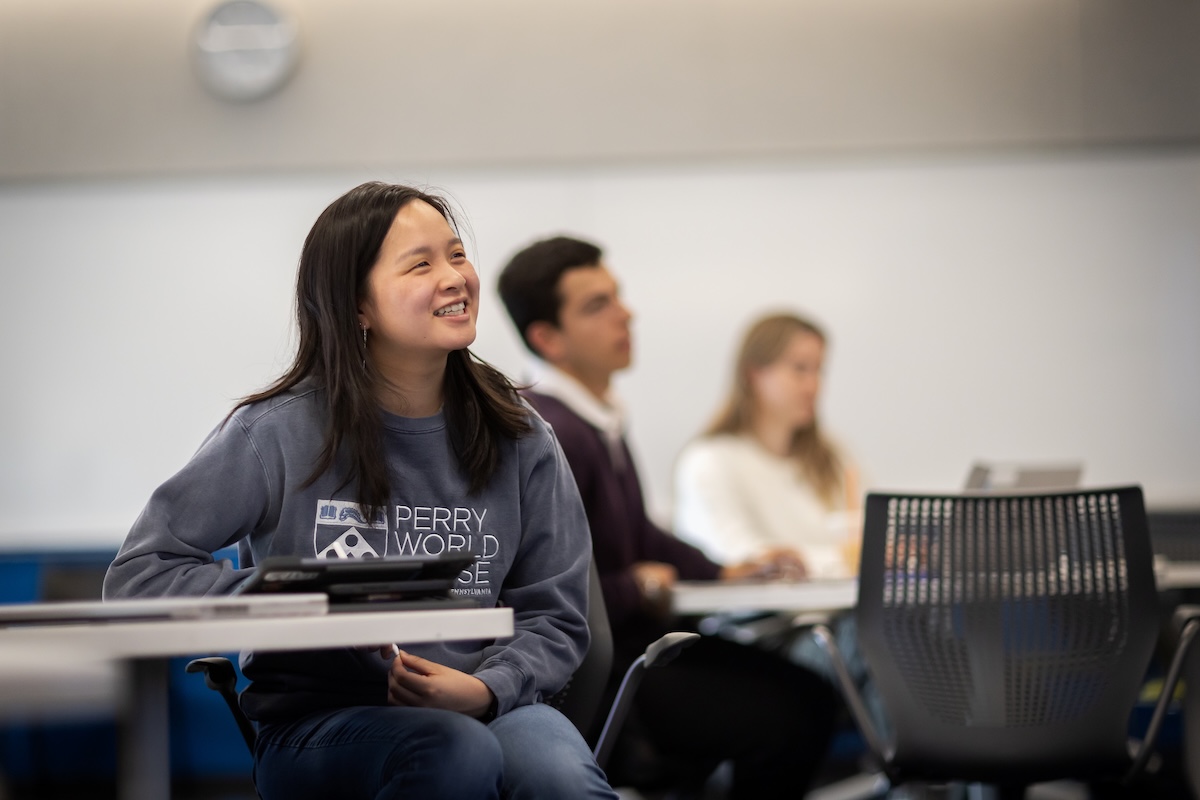
Each Fellow was paired with mentors who aligned with their specific interests. Angerer, for instance, who is pursuing a master’s in Materials Science and Engineering (MSE), worked with combined-degree alumna Julia Yan (MSE’22), co-founder of Baleena, which is developing microplastic filters for laundry machines. “We’re both interested in sustainability,” says Angerer.
Additional mentors included undergraduate alumnus Utkarsh Shah (CIS’16), the founder of Hexmodal, which makes smart devices for healthcare facilities; combined-degree alumna Smitha Gopal (BE’10), COO and co-founder of Ounce of Care, which provides health and social services to residents of affordable housing communities; and doctoral alumna Cassidy Blundell (BE’18), who invests in biotechnology companies at Mission BioCapital.
These mentorships were designed not just to reinforce classroom lessons but to provide firsthand insights into how business concepts play out in the real world. “He’s actually been walking me through a term sheet that maps to the National Venture Capital Association (NVCA) Model Documents,” says Park of her mentor, Daniel Deeney (GEx’02), co-founder and CEO of Paladin Cloud, an AI-powered cybersecurity startup.
For Park, this meant breaking down the terms in funding documents — including share allocations, pricing and valuation strategies — that would shape real investment deals. “He’s giving me practical resources and explaining technical issues I wouldn’t have encountered otherwise.”
From Theory to Practice
Last summer, building on the lessons learned from their mentors, the Fellows fanned out across the eastern seaboard for internships at startups in the portfolios of the program’s partner companies — Eniac Ventures, Insight Partners, NewSpring Capital, PACT and Red & Blue Ventures — and, in some cases, at those investment firms themselves. “That’s where students connect what we learn in the classroom to the real world,” says Cassel. “It’s totally immersive.”
Park, who is also a Perry World House Fellow and President of Penn’s chapter of the Society of Women Engineers, spent the summer at NewSpring Capital, just outside Philadelphia. She worked directly with Jonathan Brassington (GEng’97), a partner at the firm and the chair of Penn Engineering’s Technological Innovation and Entrepreneurship Advisory Board. “I saw firsthand the effort and dedication investors put into adding value for companies in addition to the capital they provided,” says Park.
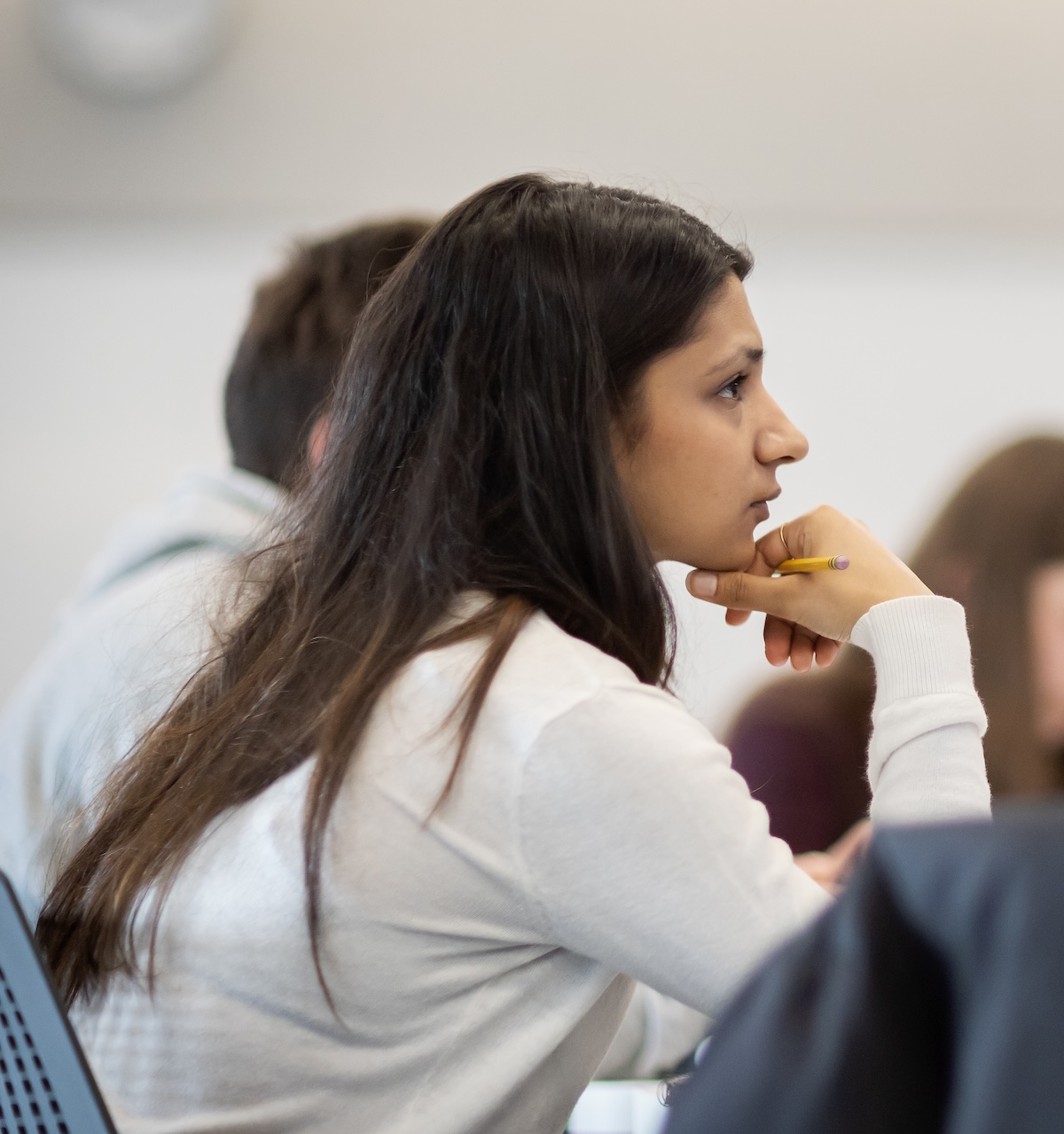
As part of her internship, she attended board meetings in which investors used essentially the same concepts she had learned in class for developing her hypothetical startup. “The end goals were different, but the methodologies were the same, whether I was analyzing companies for potential investment or helping the firm provide mentorship to portfolio companies.”
For his part, Bakalov interned at Limax Biosciences, in Boston. Co-founded by doctoral alumnus Benjamin Freedman (BE’17), the firm specializes in developing hydrogels, flexible adhesives that can seal surgical leaks, deliver medications and help tissues heal. “Considering my own ambitions of becoming a physician-scientist,” says Bakalov, “this summer internship was an incredibly insightful experience. I learned first hand the process of translating research findings into solutions that actually help people.”
In addition to interviewing physicians, researching competitors and assisting with grant writing, Bakalov also got to influence the product design. One day, for example, he traveled with colleagues to a manufacturing facility near Boston for a planning session involving new prototypes. “I appreciated the opportunity to actually contribute significantly to the conversation, which revolved around incorporating our hydrogel into a specific type of medical device,” he says.
The summer internships proved a boon not just to the Fellows, but to the founders and investors for whom they interned. Shah, who also served as Bakalov’s startup mentor, hosted master’s student Emily Oh (SSE’25). “Her background meant she already knew how to approach a business from a foundational perspective and ask the questions that matter,” Shah says. “She took on a complex project that had been a bottleneck for months, and she worked tirelessly to see it through to completion.”
Shaping Tomorrow
Ultimately, the Sugi and Millie Widjaja Entrepreneurship Fellows Program equips participants with the tools they need to chart impactful careers on their own terms, leveraging everything they’ve learned as engineers in the context of business.
For Kanoria, co-founder of AgriVue, the fictional agricultural sensor company, and a master’s student in Data Science, knowing how startups operate is a mindset that applies to any role. “It’s more of a way of thinking,” she says. “You can have startup culture and startup methodology within a larger company.”
Some Fellows, like Oh, have already accepted full-time roles at the startups for which they interned. “We’re thrilled to have Emily joining us full time,” says Shah. “She migrated us from a labyrinth of spreadsheets towards a software-based management system that allows us to understand our business needs and performance.”
Sugi Widjaja and Millie Wan, the program’s namesakes, hope students will use their experience as Fellows creatively. “People change careers all the time,” says Wan. “We want to empower students to pursue different paths.”
As entrepreneurs discover every day, the future is hard to predict, but the right tools make all the difference. “Engineers love creating things and their education gives them the technical skills to do it,” says Shah, who minored in Engineering Entrepreneurship. “Teaching them entrepreneurship helps them to identify the right problems to solve and bring their creations to market.”
When engineers bring new technologies to market, the benefits ripple across society. “I’ve seen firsthand how the intersection of entrepreneurship and technology has transformed lives, even in emerging markets,” says Widjaja. “I want Penn students, especially engineering students, to imagine what’s possible. This program creates space for them to envision how they can use their skills and education to change the world.”
To learn more about the Widjaja Entrepreneurship Fellows, please visit the program’s webpage. If you are affiliated with a startup or investment firm in the northeast corridor and would like to collaborate with the Fellows program, please contact Sevile Mannickarottu at sevile@seas.upenn.edu.
